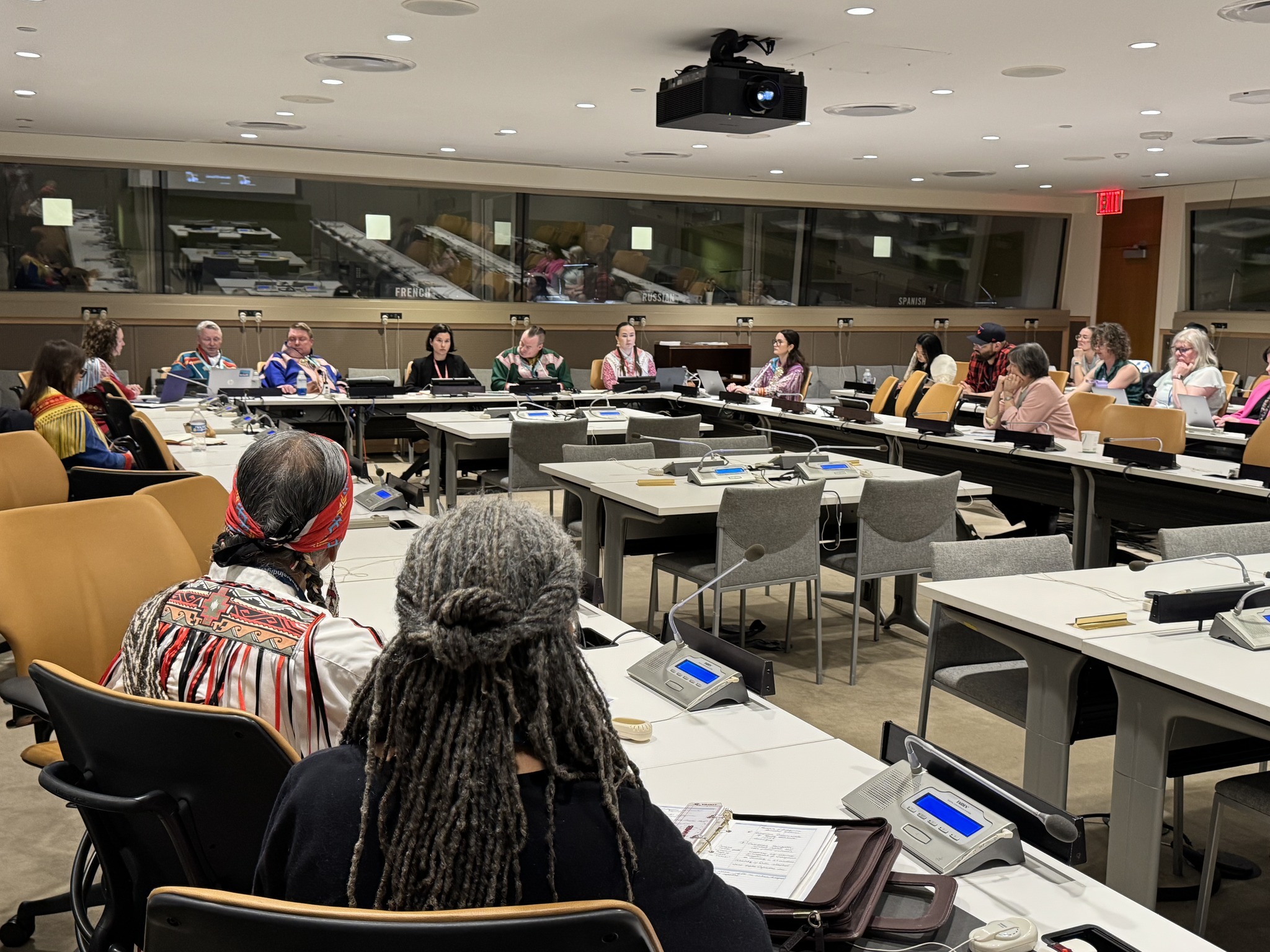New York, 22 April 2025 – At a powerful side event during the United Nations Permanent Forum on Indigenous Issues (UNPFII), Indigenous reindeer herders, Sámi political leaders, and international experts convened to spotlight the challenges of land fragmentation and its impact on implementing the United Nations Declaration on the Rights of Indigenous Peoples (UNDRIP) pushing Arctic and sub-Arctic reindeer pastoralism toward a tipping point.
Organized by the American Museum of Natural History, the International Centre for Reindeer Husbandry (ICR), and the GEF-UNEP Reindeer Herding and Resilience Project, the session highlighted the escalating pressures facing Indigenous nomadic pastoralists and called for urgent action to safeguard their futures.
Mary Blair, Associate Director of the Center for Biodiversity Conservation at the American Museum of Natural History, moderated the event, which focused on Indigenous reindeer herders and solutions for implementation to support Indigenous futures.
“Reindeer herding is a nomadic civilization of the Arctic,” said Anders Oskal, Secretary General of World Reindeer Herders and Executive Director of ICR. “Land degradation and fragmentation are not just environmental issues; they threaten the very existence of the Indigenous civilization.”
Per-Olof Nutti, President of the Sámi Council, underscored the emotional and cultural toll of encroachment and noted its link to rising mental-health stress in herding communities: “Fragmentation spreads across our lands like a slow-moving cancer, weakening us violently. Adaptation is rooted in movement across seasonal landscapes – when that is lost, our identity, language, and culture are put at risk.”
Panelists addressed the critical need for legal protections and stronger implementation of UNDRIP. Maren Benedicte Storslett of the Sámi Parliament in Norway emphasized the importance of Indigenous knowledge and education: “Traditional Sámi knowledge must be included in impact assessments. It is not enough to study nature without Indigenous voices – it is about justice, sustainability, and cultural survival.”
Highlighting the situation in Finland, Tuomas Aslak Juuso, President of the Sámi Parliament of Finland, warned: “Land management is decided by others. Even if Sámi rights are recognized constitutionally, in practice, projects driven by industrial and economic interests are fragmenting reindeer pastures without adequate assessments of the real impacts on Sámi livelihoods.”
Youth leaders made it clear that the future is at stake. Sara-Elvira Kuhmunen, President of the Sámi Youth Association in Sweden, spoke passionately: “For us, the so-called green transition is a dark transition if it sacrifices Indigenous rights. We need education, leadership, and recognition that our future is not expendable.”
From Mongolia’s East Taiga, representing Dukha reindeer herders in Mongolia, Khongorzul Mungunshagai described how strict conservation laws restrict herders’ mobility and trap Dukha families in limited zones, eroding traditional practices: “We are losing parts of our culture, piece by piece.”
Ravdna BME Sara, a Sámi reindeer herder and a PhD researcher from Norway, offered a vivid example of the impacts of industrialization on pasturelands: “Land fragmentation equals loss of economy, loss of traditional knowledge, and loss of food systems. Enough is enough.”
Marina Tonkopeeva, Project Manager for the Reindeer Herding and Resilience Project, emphasized the need for ethical research practices and Indigenous-led monitoring: “Policy responses must prioritize halting land degradation and involve Indigenous herders in every stage of decision-making and research”. She added that strengthening cooperation between Indigenous knowledge holders, researchers, and industry is essential for creating ethical, respectful partnerships based on co-production of knowledge and mutual benefit.
Maryam Niamir-Fuller, a leading expert on pastoralism and sustainable development, urged states to recognise rangelands as vital carbon stores and biodiversity reservoirs, not vacant lots for development. She added, “Pasturelands are not wastelands. They are landscapes managed sustainably for millennia by Indigenous pastoralists who have developed an intense symbiotic relationship with the land… Your voices must continue to be heard loud and clear.” The session ended with a call for collaborative solutions and mobilization towards 2026, declared by the United Nations as the International Year of Rangelands and Pastoralists. As Anders Oskal concluded: “Let’s build a future where Indigenous pastoralists’ rights are truly respected – not just in words, but in action.”



